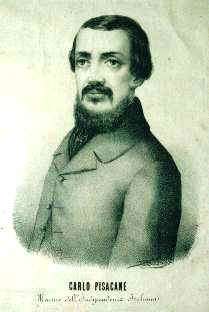Carlo Pisacane

Carlo Pisacane, Duke of San Giovanni (22 August 1818 – 2 July 1857) was an Italian patriot and one of the first Italian socialist thinkers. He argued that violence was necessary not only to draw attention to, or generate publicity for, a cause, but also to inform, educate, and ultimately rally the masses behind the revolution. These ideas are called propaganda of the deed and have exerted compelling influence on rebels and terrorist alike ever since.
Biography
Pisacane was born in Naples to an impoverished noble family, and entered the Neapolitan army in 1839; but having become imbued with Mazzinian ideas he emigrated in 1847, and after a short stay in England and France served in the French army in Algeria.
The revolution of 1848 recalled him to Italy; he played a part in the brief Roman Republic, and was an instrumental part of the war commission in the defence of the city. After its capture by the French, he again went into exile, first to London and then to Genoa, maintaining himself by teaching.
Pisacane regarded the rule of the House of Savoy as no better than that of Austria. When Mazzini, undeterred by the failure of the abortive Milan rising on the 6th of February, 1853, determined to organize an expedition to provoke a rising in the Neapolitan kingdom, Pisacane offered himself for the task, and sailed from Genoa with a few followers (including Giovanni Nicotera) on board the steamer Cagliari on 25 June 1857.
They landed on the island of Ponza, where the guards were overpowered and some hundreds of prisoners liberated, and on 28 of the same month arrived at Sapri in Campania and attempted to reach the Cilento. But hardly any assistance from the inhabitants was forthcoming, and the invaders were quickly overpowered at Padula, Pisacane himself being brutally stabbed with a knife then killed at Sanza by angry locals who did not recognise him believing him to be a wandering gypsy who was stealing their food.
Today the town of Sanza has an annual feast on the day of his death known as Carlo Pisacane Day where they celebrate his murder. There is also a commemorative statue.
Propaganda of the deed
Pisacane was a pioneering advocate of propaganda of the deed, arguing that "ideas result from deeds, not the latter from the former, and the people will not be free when they are educated, but educated when they are free." He argued that violence was necessary not only to draw attention to, or generate publicity for, a cause, but also to inform, educate, and ultimately rally the masses behind the revolution. These ideas have exerted compelling influence on rebels and terrorist alike ever since.[1]
During the historical period known as Risorgimento, Pisacane represented the extreme left, and as a follower of French philosopher Pierre-Joseph Proudhon introduced Anarchism in Italy. His essays, titled Saggi and Testamento Politico, were published posthumously in France.
He was an atheist.[2]
Benito Mussolini was heavily influenced by Pisacane's revolutionary ideas and ideals to achieve political goals.[3]
Arts and culture
The landing is remembered in the poem La spigolatrice di Sapri by Luigi Mercantini, composed in the same year. This poem in turn inspired the title of the 1952 film about the landing, Eran trecento. It was also translated into English by Henry W. Longfellow with the title The Gleaner of Sapri.
In August of every year Carlo Pisacane's landing is celebrated in a three-day festival in Sapri.
References
- ↑ Hoffman, Bruce.(2006). Inside terrorism. New York, N.Y. Columbia University Press, p.5
- ↑ Massimo Viglione, Libera Chiesa in libero stato? Il Risorgimento e i cattolici: uno scontro epocale, Città Nuova, 2005, p. 137.
- ↑ Anthony James Gregor (1979). Young Mussolini and the Intellectual Origins of Fascism. University of California Press. pp. 7, 193, 224, 228.
Further reading
- Carlo Pisacane. La Rivoluzione. Revolution: An alternative answer to the Italian question translated and introduced by Richard Mann Roberts. (2011)